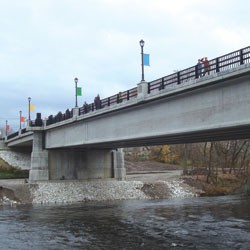
- Cross Street Bridge
Last Saturday’s festive opening of Middlebury’s second downtown bridge was also a celebration of local self-reliance — and of wealthy benefactors.
It took 58 years for the town to build an Otter Creek crossing to replace a covered bridge that was destroyed by fire in 1952. But the process accelerated considerably when Middlebury College stepped forward in 2007 with an offer to pay more than half the cost of a span — arching above Mister Up’s restaurant — that radically alters the appearance of the shire town’s central artery. Middlebury voters covered the $7 million balance on the $16 million Cross Street Bridge by approving a 1-cent local sales tax that will stay in place until 2038.
Ground breaking took place in April 2009, in the middle of the recession. Less than 19 months later, a Morgan-horse-drawn carriage led a Halloween Eve parade across what’s billed as “the longest prestressed concrete bulb-tee girder span in the country.” The old Steele’s service station, across from Otter Creek Bakery, is gone, supplanted by a traditional New England roundabout.
Compare the Midd bridge’s speedy progress with the 25 years that have elapsed since the paving of the first — and never-used — portion of Burlington’s Southern Connector. Or the 17 years that have passed since the opening of a four-mile section of the Chittenden County Circumferential Highway, 12 miles of which remain unbuilt.
What accounts for the difference? Liberal Vermonters may not like to admit it, but the absence of state and federal involvement is what enabled Midd’s new bridge to be completed so expeditiously.
By eschewing Washington’s standard 80 percent funding for bridges, Middlebury avoided a review process that could have dragged on … and on. Further motivation? A 2006 decision by Vermont transportation officials to give priority to existing bridges in need of repair.
“It’s an incredible statement that it got done so quickly,” declared local historian Jan Albers as more than 1000 locals strolled across the bridge on a gray day. Many used Halloween as an excuse to wear costumes, including one dressed up as Henry Sheldon, the namesake of Middlebury’s Sheldon Museum of Vermont History and the first person to cross the town’s Main Street bridge over Otter Creek 117 years ago.
Another 19th-century reference of the Cross Street Bridge: Its financing echoes the town-private funding formula that paid for that original downtown overpass. Back then, it was the richest man in town, real estate baron Joseph Battell, who covered 55 percent of the $31,000 cost of the stone crossing that now bears his name. Today, Middlebury College — by far the town’s wealthiest institution, with an endowment of more than $800 million —is picking up 56 percent of the tab for the new bridge.
It was concern over safety, as much as town-gown solidarity, that prompted Middlebury College President Ron Liebowitz to lobby college trustees on behalf of the bridge. The school announced its gift one month after a toxic spill from a train derailment closed Main Street for almost 24 hours in October 2007. The accident underscored the town’s dependence on its sole central crossing of the Otter Creek. It was evident that disaster could ensue if emergency vehicles were unable to use the Battell Bridge to reach the college.
Liebowitz made a featured, but understated, appearance on Saturday. Wearing jeans and a blue and orange windbreaker, he walked near the head of the parade with his wife, Jessica, and the couple’s three kids.
But not everybody at Saturday’s ceremony was celebrating the new construction. “This is a big investment in infrastructure for the sake of cars, tourists and trucks,” complained Robert Wagner, a Ripton resident who just ran for an Addison County seat in the state Senate. “This money could have gone for energy independence,” he said, citing a recent unsuccessful plan to build a hydropower station alongside the Battell Bridge at Great Falls.
Some in the crowd just seemed skeptical. “It will certainly take some getting used to,” said gray-haired Middlebury resident Eleanor Bliss. “It’s so big!” Bliss also expressed doubt that the bridge will shorten the traffic jams that make Main Street resemble an elongated parking lot during “rush hour” and on busy weekends.
“They say it’ll alleviate traffic,” added Otter Creek Bakery co-owner Sarah Wood, who made a bridge-shaped cake for the occasion. “OK — let’s just say I’m optimistic that will happen. We’ll see. Besides, it’s here whether we like it or not.”
Building the bridge entailed “a big invasion for such a small town,” Wood said. Her husband, Ben Wood, noted that their bakery lost four parking spaces to the roundabout construction. The new view from the bakery is “startling,” Ben Wood added. “It sure does open everything up.”
Others are certain the bridge will achieve planners’ objectives. Town Hall Theater director Doug Anderson, who served as emcee for the music and dance performances accompanying the opening, was unconditional in his enthusiasm for the project.
“It’s going to siphon off quite a lot of the traffic,” Anderson predicted. “It will also keep trucks from going by the Town Hall Theater. You won’t hear them downshifting in the middle of the second act any longer.”
Most of all, Anderson added, “the bridge will help us be a quaint New England town again.”









Comments
Comments are closed.
From 2014-2020, Seven Days allowed readers to comment on all stories posted on our website. While we've appreciated the suggestions and insights, right now Seven Days is prioritizing our core mission — producing high-quality, responsible local journalism — over moderating online debates between readers.
To criticize, correct or praise our reporting, please send us a letter to the editor or send us a tip. We’ll check it out and report the results.
Online comments may return when we have better tech tools for managing them. Thanks for reading.